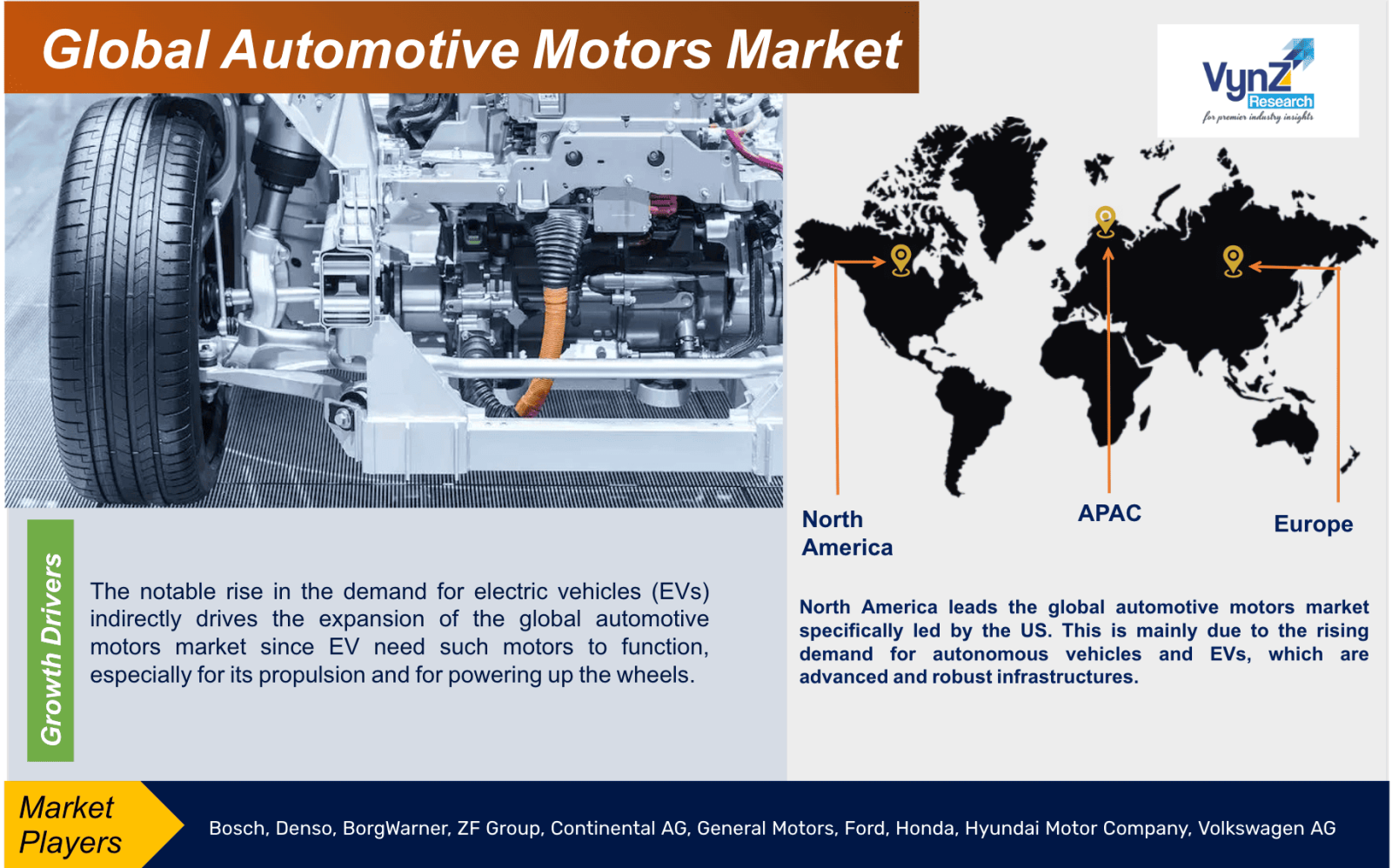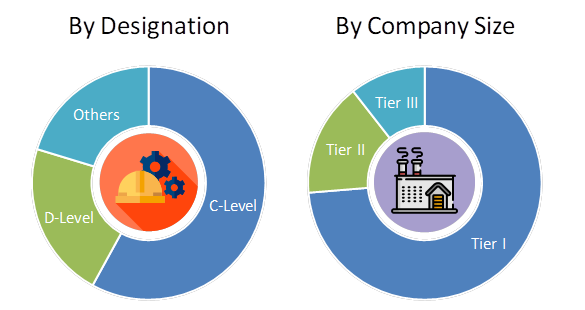| Status : Published | Published On : Nov, 2024 | Report Code : VRAT9642 | Industry : Automotive & Transportation | Available Format :

|
Page : 198 |

Global Automotive Motors Market Size & Share | Growth Forecast Report 2030
Industry Insights By Motor Type (Brushed DC Motor, Brushless DC Motor, Traction Motor, and Stepper Motor), By Sales Channel (original equipment manufacturers (OEMs) and Aftermarket), By Application (Safety, Comfort, and Performance), By Vehicle Type (BEV and PHEV, and Non-electric Vehicles), and By Geography (North America, Europe, Asia Pacific and Middle East & Africa).
Industry Overview
The global automotive motors market size was valued at USD 22.9 billion in 2023. It is likely to grow up to USD 28.2 billion by 2030 at a CAGR of 5.8% during the forecast period ranging between 2025 and 2030.The higher adoption of motors with more sophisticated features to ensure safety and security and the integration of such features into the vehicles, such as advanced driver-assistance systems (ADAS) and automatic braking, pushes the market forward. This is primarily due to the rising demand for safer motors that offer maximum functionality, which is facilitated by the precision motor-driven parts in different systems, making them a crucial component in modern cars especially.

Small machines that convert electricity into motion are called automotive motors, and these systems typically help a vehicle like a car, a bus, or a truck work better. These automotive motors are typically used to start an engine or perform other similar functions, such as moving electric windows or running a fan. Modern automotive motors are more efficient and powerful irrespective of their size, mainly due to the use of advanced modern technology and high-performing elements such as coils and magnets that help create movement. Use of automotive motors offers significant benefits such as lower air pollution and environmental impact, greater efficacy in performance and fuel consumption.
Global Automotive Motors Market Report Coverage
|
Report Metric |
Details |
|
Historical Period |
2018 - 2023 |
|
Base Year Considered |
2024 |
|
Forecast Period |
2025 - 2030 |
|
Market Size in 2024 |
U.S.D. 22.9 Billion |
|
Revenue Forecast in 2030 |
U.S.D. 28.2 Billion |
|
Growth Rate |
5.8% |
|
Segments Covered in the Report |
By Motor Type, By Sales Channel, By Application and By Vehicle Type |
|
Report Scope |
Market Trends, Drivers, and Restraints; Revenue Estimation and Forecast; Segmentation Analysis; Impact of COVID-19; Companies’ Strategic Developments; Market Share Analysis of Key Players; Company Profiling |
|
Regions Covered in the Report |
North America, Europe, Asia Pacific and Middle East & Africa |
Industry Dynamics
Global Automotive Motors Market Trends/ Growth Drivers:
Increasing demand for electric vehicles (EVs)
The notable rise in the demand for electric vehicles (EVs) indirectly drives the expansion of the global automotive motors market since EV need such motors to function, especially for its propulsion and for powering up the wheels. These motors are also required for the functioning of other auxiliary systems, such as cooling, power steering, and automatic braking. In addition, the growing concern over environmental pollution and the impact of traditional fuel vehicles, strict regulations regarding emissions, and supportive government initiatives and incentives to promote EV adoption are significant factors that promote the demand. Furthermore, the rising shift by consumers from traditional to greener transportation and higher investments in advanced motors by manufacturers for better performance and enhanced efficiency further drive the demand for EVs and the market expansion for automotive motors.
A few other factors that drive the growth of the market are the growing shift toward compact and lightweight motors for higher fuel efficiency, the rising popularity and prevalence of autonomous vehicles that need dedicated motors to function, significant developments in motor technology such as brushless DC motors, higher automotive production in developing countries, and growing preference for vehicle electrification in regular vehicles.
Global Automotive Motors Market Challenges
The higher upfront cost of advanced motors
The initial cost of purchase of the advanced motors is usually very high. This is a major challenge for the global automotive motors market that deters its widespread adoption and growth. This high cost is attributed to the high cost of materials and modern motor technologies implemented in the manufacturing process, thereby increasing the production cost. This reduces affordability in the cost-sensitive markets, which further limits their widespread adoption. Also, other challenges of the market that hinder expansion include complex technologies and difficulty in integrating these advanced motors into existing systems, the need for advanced infrastructure to manufacture autonomous and electric vehicles, varying prices of raw materials, and strict environmental regulations on manufacturing motors.
Global Automotive Motors Market Opportunities
Rise in demand and preference for electric and hybrid vehicles
The growth opportunity to the global automotive motors marketis facilitated by the steady growth in worldwide demand for electric and hybrid vehicles. This primarily due to the promotion of EV adoption across the globe by different governments allowing subsidies and grants to the adopters. This creates a huge demand for advanced automotive motors, thereby creating novel growth avenues. Other notable growth prospects for the market include notable and rapid progress in motor technology, innovations such as energy-efficient and lightweight designs to support modern lightweight vehicles, increased demand for smart mobility systems and autonomous vehicles, and growth of automotive production in developing countries.
Global Automotive Motors Market Segmentation
VynZ Research provides an analysis of the key trends in each segment of the Global Automotive Motors Market report, along with forecasts at the regional and country levels from 2025-2030. Our report has categorized the market based on motor, sales channel, application and vehicle type.
Insight by Motor Type
- Brushed DC Motor
- Brushless DC Motor
- Traction Motor
- Stepper Motor
The brushless DC motor segment dominates due to higher efficiency
The global automotive motors market is divided according to the different types of motors into Brushed DC Motor, Brushless DC Motor, Traction Motor, and Stepper Motor segments. Out of all these segmentations, it is the brushless DC motor segment that dominates the market. It is attributed to its beneficial properties such as longevity, higher efficiency, and lower maintenance requirements. This segment is also expected to grow at a significant rate during the study period, mainly due to the higher demand and extensive use of hybrid and electric vehicles to increase their energy efficiency and performance.
Insight by Sales Channel
- Original Equipment Manufacturers (OEMs)
- Aftermarket
The OEM segment dominates due to direct integration into new vehicles
The global automotive motors market is also split into original equipment manufacturers (OEMs) and Aftermarket segments according to the sales channel. Out of these two segments, the OEM segment dominates the market since their motors are directly integrated into the new vehicles. Moreover, the growing tech collaborations with suppliers to increase the production of electric vehicles also promote the growth of this segment during the projected period.
Insight by Application
- Safety
- Comfort
- Performance
The safety applications segment dominates due to the growing demand
Different applicability divided the global automotive motors market into Safety, Comfort, and Performance segments. Out of all these segments, the safety applications segment dominates rising demand for electronic stability control (ESC), anti-lock braking systems (ABS), and other advanced safety features in EVs that pushes the demand for advanced motors.
Insight by Vehicle Type
- BEV and PHEV
- Non-electric Vehicles
The electric vehicle segment dominates due to higher demand
Out of the two segments, Electric Vehicles, divided further into BEV and PHEV, and Non-electric Vehicles, divided further into Passenger Cars, LCVand HCV, of the global automotive motors market based on the vehicle types, the former dominates the market. This is because it is the larger contributor due to the higher demand for advanced automotive motors. It is also attributed to the rising preference for greater efficiency. Furthermore, strict emission standards and significant subsidies for EV adoption also drive the growth of this segment.
GlobalAutomotive Motors Market: Geographic Overview
- North America
- U.S.
- Canada
- Mexico
- Europe
- Germany
- U.K.
- France
- Italy
- Spain
- Russia
- Rest of Europe
- Asia-Pacific (APAC)
- China
- Japan
- India
- South Korea
- Vietnam
- Thailand
- Malaysia
- Rest of Asia-Pacific
- Rest of the World (RoW)
- Brazil
- Saudi Arabia
- South Africa
- U.A.E.
- Other Countries
North America leads the global automotive motors market. It is typically led by the US. This is mainly attributed to the rising demand for autonomous vehicles and EVs, which are advanced and robust infrastructures. Mexico follows closely due to the growth in the automotive manufacturing sector.
Europe shows significant growth promises led by Germany due to the developed automotive industry and growing emphasis on the production of more electric vehicles. The UK holds the second spot due to the rising adoption of EVs and growing funding to promote sustainable technologies.
Asia Pacific is expected to grow significantly during the forecast period, mainly led by China, due to the significantly higher rate of EV adoption in this country and supportive government subsidies that accelerate such adoption. India and Japan follow closely due to notable developments in motor technology and an increase in vehicle production.
Brazil leads the Latin America region of the market due to rising automotive manufacturing and higher investments in EV infrastructure.
Middle East & Africa are emerging quite notably due to rapid urbanization, which fuels the demand for clean, efficient and green transport solutions.
Competitive Insights of Global Automotive Motors Market:
- Bosch
- Denso
- BorgWarner
- ZF Group
- Continental AG
- General Motors
- Ford
- Honda
- Hyundai Motor Company
- Volkswagen AG
PRIMARY RESEARCH INTERVIEWS - BREAKDOWN

Frequently Asked Questions
Purchase Options
Latest Report
Research Methodology
- Desk Research / Pilot Interviews
- Build Market Size Model
- Research and Analysis
- Final Deliverabvle
Connect With Our Sales Team
- Toll-Free: 1 888 253 3960
- Phone: +91 9960 288 381
- Email: enquiry@vynzresearch.com
Automotive Motors Market
